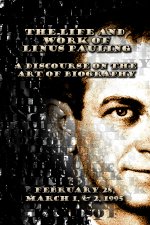Videos: Session 3: The Personal View of Linus Pauling and His Work
Session Introduction: “The Personal View of Linus Pauling and His Work.”
Crellin Pauling (Biology, San Francisco State University)
11:10 - Transcript Available
Pauling introduces Session III of the conference by recounting a number of illuminating stories from his childhood and adolescence. Pauling focuses in particular on his father's ill-fated research on the structure of DNA, mentioning that one possible contributing factor to the errors in the Pauling-Corey DNA model was Linus Pauling's disinclination toward socializing with Erwin Chargaff.
“Linus Pauling as an Educator.”
Matthew Meselson (Biology, Harvard University)
28:29 - Transcript Available
Meselson reflects upon Linus Pauling's abilities as an educator by recounting a series of events from his own experience as both an undergraduate and a graduate student at Caltech. Meselson comments on Pauling's showmanship in lecture and effectiveness as both mentor and administrator. Meselson concludes that the methods that Pauling utilized as an educator were similar to those that he employed as a scientist and as a political activist, and that studying Pauling's approach to educating may yield further insight into his larger body of work.
“The Human Side of Linus Pauling.”
Ken Hedberg (Chemistry, Oregon State University)
36:36 - Transcript Available
Hedberg, a former graduate student of Linus Pauling's, shares a number of stories mined from their multi-decade association, many of them humorous portrayals that provide a more informal portrait of Pauling's daily interactions with his peers. Hedberg touches upon the extraordinary culture of creativity that existed during his time at Caltech and also speaks to certain characteristics of Pauling's personality, including his decisiveness, wit and self-confidence. Hedberg concludes by describing the details of several trips that Pauling made to Oregon State University in the latter decades of his life.
“Reflections.”
William Lipscomb (Chemistry, Harvard University)
42:17 - Transcript Available
Lipscomb provides a technical overview of many of Linus Pauling's important scientific contributions. In so doing, he covers both the historical and scientific details of a number of milestone achievements concerning complex ionic crystals, electroneutrality, covalency, hemoglobin, the structure of proteins and complementarity. A graduate student of Pauling's, Lipscomb also shares a collection of stories related to their acquaintance and offers a few thoughts on the course that Pauling's career may have taken had he stayed at Caltech following his receipt of the Nobel Peace Prize in 1963.
“My Memories and Impressions of Linus Pauling.”
David Shoemaker (Chemistry, Oregon State University)
17:35 - Transcript Available
Shoemaker recounts his memories of working as a graduate student under Linus Pauling and in collaboration with Ken Hedberg and William Lipscomb. Notably, Shoemaker shares a story of visiting the Paulings in England in 1948 and witnessing work that would ultimately result in the determination of the alpha-helix structure of proteins. Shoemaker also discusses Pauling's numerous contributions to the discipline of crystallography, including his later work on quasicrystals.
“Personal Reminiscences about Linus Pauling.”
Frank Catchpool (Family practitioner, Sausalito, California)
22:58 - Transcript Available
Catchpool shares his memories of Linus Pauling, beginning with a number of stories dating back to their first encounters at the Albert Schweitzer medical compound in west central Africa. Catchpool then discusses his time at Caltech researching anesthesia and observing the development of Pauling and Emile Zuckerkandl's theory of the molecular clock. Catchpool concludes his talk with a few remarks on Pauling's legacy as a peace activist.
Watch Other Videos
Session 1: Linus C. Pauling Day Lecture
- Ken Van Holde - Introduction of Francis Crick.
- Francis Crick - “The Impact of Linus Pauling on Molecular Biology.”
Session 2: The Biographer's Picture of Linus Pauling
- Fred Horne - Session Introduction: “The Biographer's Picture of Linus Pauling.”
- Tom Hager - “The Bootlegger's Son: Or the Stochastic Method in Biography.”
- Ted Goertzel - “Analyzing Pauling's Personality: A Three Generational, Three Decade Project.”
- Robert Paradowski - “The Biographical Quest: Some Personal Reflections of a Pauling Biographer on the Art and Science of Scientific Biography.”
- Lily Kay - “The Biographer's Picture of Linus Pauling.”
- Derek Davenport - “Boswellizing Pauling.”
Session 3: The Personal View of Linus Pauling and His Work
- Crellin Pauling - Session Introduction: “The Personal View of Linus Pauling and His Work.”
- Matthew Meselson - “Linus Pauling as an Educator.”
- Ken Hedberg - “The Human Side of Linus Pauling.”
- William Lipscomb - “Reflections.”
- David Shoemaker - “My Memories and Impressions of Linus Pauling.”
- Frank Catchpool - “Personal Reminiscences about Linus Pauling.”
Session 4: Historians and Contemporary Scientific Biography
- S.S. Schweber - “Writing the Biography of a Living Scientist: Hans Bethe.”
- Frederic L. Holmes - “Historians and Contemporary Scientific Biography.”
- Judith Goodstein - “Tales In and Out of 'Millikan's School.'”
- Robin Rider - “Manuscript Collections in the Biographical Enterprise.”
- John L. Heilbron - “Remarks on the Writing of Biography.”


